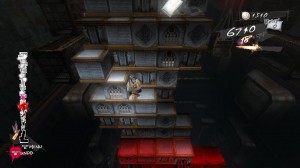Catherine Review (360)
- Updated: 6th Feb, 2012
 Perhaps it’s fitting that Catherine frames itself as an episode in part of a fictional TV show. It feels so much like an actual series that has gone on far too long and has introduced tangential elements to keep people interested. The show would have started by focusing almost entirely on the main plot, but keeps adding layers of importance to sections that aren’t amazing. In the end, the majority of the experience isn’t really the product you were initially interested in.
Perhaps it’s fitting that Catherine frames itself as an episode in part of a fictional TV show. It feels so much like an actual series that has gone on far too long and has introduced tangential elements to keep people interested. The show would have started by focusing almost entirely on the main plot, but keeps adding layers of importance to sections that aren’t amazing. In the end, the majority of the experience isn’t really the product you were initially interested in.
Catherine is two games, kind of. It’s actually more like a game and a selection of things that feel a bit like they’re almost a game. For as much as it paints itself as a dating sim, that really is secondary to a more prominent puzzle system that involves moving assorted blocks around so that you can climb further up massive towers. In Catherine you control Vincent, an early-thirty-something in a relationship with Katherine (with a K!). She’s concerned that they aren’t moving forward and is looking for more commitment, but he’s overly self-absorbed, clinging on to his fleeting adolescence and peaceful bachelorhood. After a night of drinking, Vincent inadvertently ends up in bed with Catherine (without a K!) and begins having a series of horrible nightmares wherein, obviously, he’s a part-human-part-sheep scaling walls of movable crates.
 From here the game takes on three parts. During the day you’ll be treated to cutscenes that further expand on Vincent’s relationships with the two girls. In the evening, Vincent goes out to a bar to drink and chat with other people that are experiencing the same nightmares. After you turn in to sleep you play through a few challenging block puzzles.
From here the game takes on three parts. During the day you’ll be treated to cutscenes that further expand on Vincent’s relationships with the two girls. In the evening, Vincent goes out to a bar to drink and chat with other people that are experiencing the same nightmares. After you turn in to sleep you play through a few challenging block puzzles.
Catherine’s narrative is absolutely detached from the gameplay in a way that seems almost inexcusable after Portal so effortlessly blends story into the playable sections. The disconnection makes both parts seem like they’re the least important part of the product. The story seems as if it’s getting in the way of a game being a game; the game seems as if it’s getting in the way of a narrative being delivered like an anime series. Atlus could, in theory, have released these halves entirely separate and we would have never considered they were once part of the same licence.
On occasion during sections in the bar or between puzzle stages, you’ll be given totally binary options that govern how you’ll react to different characters or odder choices about your own relationship hang-ups. Some of this is interesting as the game will often show a graph of what other people said in reaction to the same question. This interactivity is novel, but is awful in some sections. As much as you (and by extension, Vincent) make decisions about what to do with Catherine’s interruption into your life, this isn’t reflected in his attitude toward her. You could be entirely cold and uninterested and she’ll still be a part of the story until the end. This makes your choices seem meaningless throughout and even your ending might not reflect the direction the narrative has been propelling toward.
Unfortunately, as it’d be much easier for me to explain, it’s difficult to call any part of Catherine particularly bad. Certainly in some cases it’s unenjoyable, but there’s always a saving grace. The block puzzles get a little tiresome and frustrating – perhaps as a result of being jackhammered into the middle of the story as if they’re work you have to complete before reaching the good part – but they’re deep and interesting enough to take pleasure in. The story sections are too small a part of the whole experience and your input far is too minimal. Still, the supporting cast are layered enough to be compelling and you’ll be interested to see how the plot progresses.
If Catherine is anything, it’s a step forward for games using relationships in a more adult way. Catherine definitely is a game for adults, not just in the sense that there’s some extreme violence and almost constant alcohol abuse, but it’s really one of the first mainstream titles to put growing up and finding your place in life as the core struggle. If it were a more cohesive package, one that paid more attention to either of the ideas it sets up, this would be an amazing title. It just doesn’t excel enough at any one thing.


Follow Us!